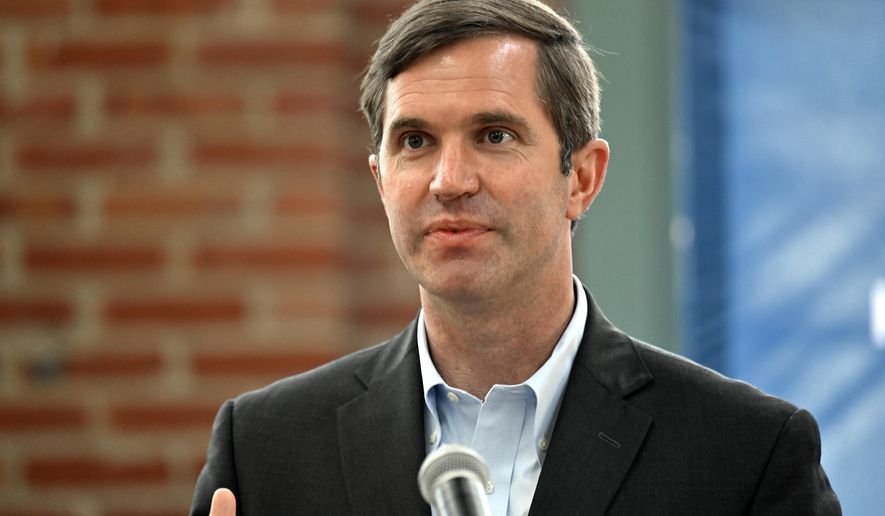LOUISVILLE, Ky. (AP) - Gov. Andy Beshear signed legislation Friday creating a financing plan to stimulate economic growth in western Louisville, calling it a good start to overcoming “decades of neglect.”
Rural and urban lawmakers banded together to pass the measure aimed at rejuvenating economically distressed neighborhoods in Kentucky’s largest city. Beshear’s signature came as he decided the fate of more bills passed at the end of this year’s legislative session.
The Democratic governor signed another bill aimed at smoothing the transition for Kentuckians getting out of prison. People who have served their time “deserve a fair shot at re-entry into society, and it’s our job to make sure they have the tools they need to succeed,” he said.
Beshear vetoed a bill that would have offered tax breaks to lure data centers and so-called remote workers to Kentucky. The governor said he was concerned about some of the bill’s language and the “rushed nature” in passing it. Crafting such incentives needs more time and discussion, he said.
Republican House Speaker David Osborne called the veto “regrettable,” saying the incentives could have been a “major asset” for the state’s economic development efforts. With the session completed, the GOP-dominated legislature won’t have a chance to override the veto.
The Kentucky Senate’s top leader joined the governor in a bipartisan signing ceremony for the measure creating a tax increment financing district meant to uplift largely minority neighborhoods in western Louisville. Republican Senate President Robert Stivers, who represents an Appalachian district, put his political clout behind the legislation.
“It is really a very good day, a new beginning for the West End of Louisville,” Stivers said at the bill-signing ceremony at the Kentucky Center for African American Heritage.
To stress the bill’s statewide significance, Stivers recited Kentucky’s motto: “It’s a new day and a great day for the state of Kentucky as a whole. United we stand and divided we fall.”
The new law establishes a tax increment financing (TIF) district and a structure that will spur community-driven decisions on how to reinvest local tax dollars to create new opportunities in the West End, supporters said. Its neighborhoods have struggled from decades of disinvestment.
Beshear noted that 80 cents of every $1 of revenue now generated in western Louisville flows elsewhere. The new law will create $30 million of seed money for West End investments.
“That is a good start to address decades of neglect,” the Democratic governor said.
A TIF district allows for development to be financed with future tax revenues from the increases in property values, as well as in sales taxes and other kinds of taxation that are anticipated as an area’s economic revitalization occurs.
State Rep. Pamela Stevenson, a Louisville Democrat, said the measure creates opportunities for members of the community to “take the ball and run.”
“Be the one that makes this work,” she said in urging community involvement.
Stevenson also stressed that a more prosperous western Louisville will benefit all of Kentucky.
“As West Louisville goes, so goes the state of Kentucky, because we will prosper,” she said. “You can’t have a community of 67,000 people not be thriving and expect that the state is going to thrive.”
Meanwhile, Beshear signed legislation to help ex-prisoners overcome obstacles in starting new lives. The bill sets up a process for inmates to receive assistance in gathering documents needed for employment, housing and to take classes after their release. Inmates also would receive certificates for completing job training, continuing education or other programs while incarcerated.
Beshear praised the measure as an example of providing people with “second chances.” Republican Rep. Kim Moser, the bill’s lead sponsor, said it can help tackle the “cycle of relapse and recidivism” and guide people toward lives of “self-sufficiency through employment.”
In his veto message on the tax-incentive bill, Beshear said he supports “reasonable incentives” to support the creation of data centers. He said he supports the concept of incentives for remote workers - defined in the bill as Kentuckians working in their homes for out-of-state companies.
“I have concerns about the drafting of this particular language, as well as the rushed nature in which the bill was passed,” the governor wrote. “Legislation crafting these programs requires more time, discussion and nuance.”
The House speaker said the legislation was the result of bipartisan work.
“It is regrettable that the governor chose to veto legislation that has the potential to be a major asset to our economic development efforts,” Osborne said in a statement.




Please read our comment policy before commenting.